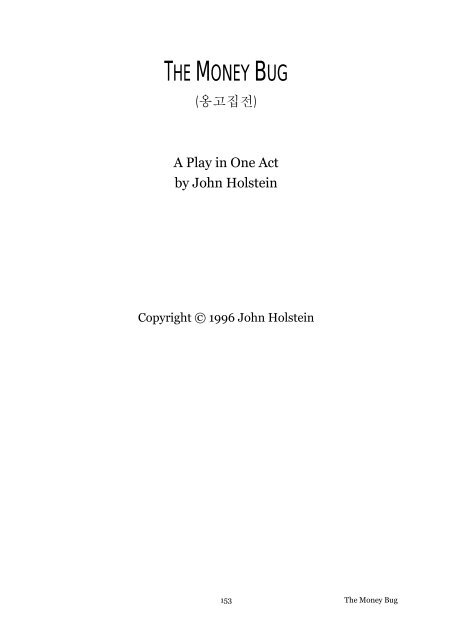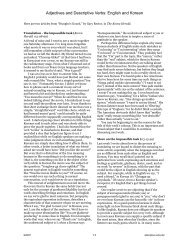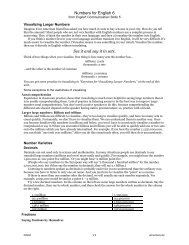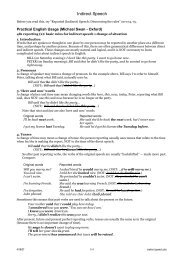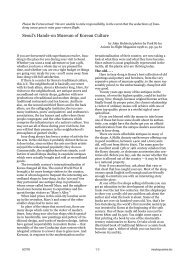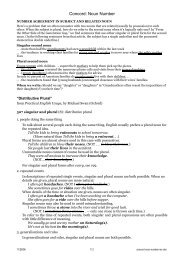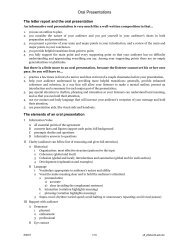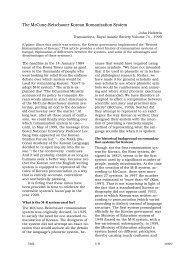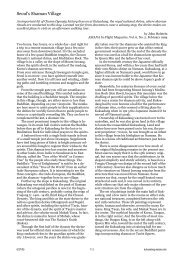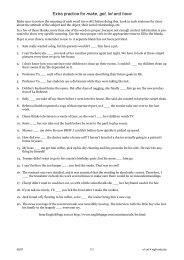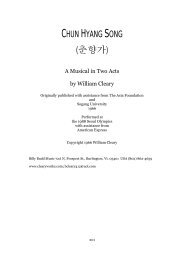THE MONEY BUG - Korea Mosaic
THE MONEY BUG - Korea Mosaic
THE MONEY BUG - Korea Mosaic
You also want an ePaper? Increase the reach of your titles
YUMPU automatically turns print PDFs into web optimized ePapers that Google loves.
<strong>THE</strong> <strong>MONEY</strong> <strong>BUG</strong><br />
(옹고집전)<br />
A Play in One Act<br />
by John Holstein<br />
Copyright © 1996 John Holstein<br />
153<br />
The Money Bug
The Money Bug<br />
Scenes<br />
Scene 1<br />
Scene 2<br />
Scene 3<br />
Scene 4<br />
Scene 5<br />
Scene 6<br />
Scene 7<br />
Scene 8<br />
Scene 9<br />
Ong takes inventory<br />
A poem by Hakdaesa and Dosa<br />
Ong abuses Hakdaesa<br />
Hakdaesa creates Phong<br />
Ong and Phong contest<br />
Ong’s and Phong’s new lives<br />
The Test<br />
Forgot something!<br />
Home sweet home<br />
A Yang for Every Yin 154
Cast of Characters<br />
In order of appearance<br />
ONG GO-JIP<br />
a nasty, rich miser<br />
MO<strong>THE</strong>R<br />
Ong’s mother<br />
WIFE<br />
Ong’s wife<br />
TURNIP<br />
a maidservant in Ong’s house<br />
STUMP<br />
a male servant in Ong’s house<br />
HAKDAESA<br />
a monk with magical powers<br />
DOSA<br />
a Taoist sage-wizard<br />
PHONG<br />
Phony Ong; Ong’s spitting image and<br />
nemesis<br />
PANCAKE<br />
a male servant in Ong’s house<br />
FUNCTIONARIES<br />
assigned to Satdo<br />
SATDO<br />
magistrate of the region Ong lives in<br />
BEGGAR<br />
Hakdaesa in disguise<br />
155<br />
The Money Bug
The Money Bug<br />
Scene 1: Ong takes inventory<br />
Lights down, the theatre is dark. The sound of a moktak. A spotlight comes up gradually<br />
on the monk Hakdaesa, standing at stage right, dressed in a wide-brimmed monk’s hat,<br />
monk’s robes, prayer beads around his neck, holding his moktak (to which the tapper is<br />
tied with a string) at heart level. Hakdaesa stops tapping the moktak and recites...<br />
HAKDAESA: (slowly, enunciating clearly) … and the Buddha said, ‘Cling to nothing whatsoever as “I”<br />
or “mine.’’<br />
ONG: (Maintaining rhythm with the monk’s “I or mine,” exuberantly, startlingly loud) A-l-l-l (full<br />
lights abruptly) MINE...!<br />
Ong is sitting on a cushion on the floor in his garden pavilion; past the pillars of the pavilion<br />
we can see a palatial main house and sumptuous grounds with sculptures and<br />
fountains, streams and miniature mountains fabricated from big rocks. He is taking inventory<br />
of his possessions, with a long scroll on the floor in front of him and a few stacks<br />
of gold coins around him. The spot on Hakdaesa dims, but not completely, and the monk<br />
stays and watches Ong, amusement mixed with concern.<br />
ONG: Mine! All mine! 2,102 sacks of grain, six riding horses, 22 pigs, male and female, 60 chickens.<br />
Ten pieces of brassware, three blanket chests, two coin chests, three stacker chests, a floral-motif<br />
documents chest, dragon chest, phoenix chest, Japanese chest, a landscape screen, lotus screen,<br />
peony screen with plum panel, and an impressive library of the Thousand Basic Chinese Characters,<br />
Doctrine of the Mean, Book of Documents, Ceremonies and Rituals, Rituals of Zhou, the Greater<br />
Learning, the Lesser Learning, the Analects, Mencius, the Book of Odes, Book of Changes, Chronicles<br />
of Lu — or, if you wish, the Spring and Autumn Annals — , the Book of Rites, and the Filial Piety<br />
Classic; 20 pair of silver chopsticks, one gold ring; 13 rolls of blue, red and purple silk, 30 rolls<br />
A Yang for Every Yin 156
of ramie, 40 rolls of cream-white high-grade silk... (getting up, looking at his property) And more!<br />
Much, much more! ALL MINE!<br />
He hears someone approaching and shows fear, covers his gold with the cushion.<br />
ONG: (angry fear) Who’s that?! What do you want?! Nothing for you here!<br />
Enter Ong’s Wife and the maidservant Turnip, along with the manservant Stump, who<br />
is carrying Ong’s Mother on his back.<br />
WIFE: (meekly, timidly) Oh my, I’m so sorry to startle you, husband. But maybe you shouldn’t take<br />
that money out and count it every day if you’re so worried about someone stealing it.<br />
ONG: If I don’t count every day how am I going to know how my money fared through the night?<br />
WIFE: How your money...? Well... I... But I thought you might want to know how your mother fared<br />
through the night.<br />
ONG: Mother? (flippantly) Oh, is she still alive?<br />
Hakdaesa notes this and walks offstage.<br />
WIFE: Oh my, what a thing to say. And with her getting worse and worse like this...<br />
MO<strong>THE</strong>R: Mumble, gurgle, burble, cough, sputter.<br />
Turnip wipes Mother’s spittle off Wife’s ear, as if it is standard procedure.<br />
WIFE: Yes, mother, I was just going to... Mother needs nourishment. Please let me take just one<br />
chicken for a pot of soup.<br />
ONG: A chicken? A whole chicken? Do you know how much we can get in the market for a whole<br />
chicken? Not selling one chicken is just like buying one chicken. And buying means spending<br />
money. And money doesn’t grow on trees.<br />
Hakdaesa’s eyes peep above the edge of the pavilion floor.<br />
WIFE: But she’ll die if we don’t give her something.<br />
ONG: And she’ll die if we do give her something. Eventually.<br />
MO<strong>THE</strong>R: Mumble, gurgle, burble, cough, sputter.<br />
Turnip wipes Mother’s spittle off Wife’s ear.<br />
WIFE: She says when she gave birth to you didn’t she care for you like her most beloved and prized<br />
possession, croon gently in your ear, “My golden boy, growing up like a beautiful white jade, you<br />
mean everything to me, you are my sun and moon,” is what she told you.<br />
MO<strong>THE</strong>R: Mumble, gurgle, burble, cough, sputter.<br />
157<br />
The Money Bug
Turnip wipes Mother’s spittle off Wife’s ear.<br />
WIFE: And she asks you now, how is it you can’t see how she’s loved you? The river god rewarded<br />
Wang Sang in Yuan China with two heavenly carp when he nearly froze to death on an ice-covered<br />
river to satisfy his cruel stepmother’s taste for fish; you could at least give your loving mother some<br />
chicken soup. She says.<br />
ONG: (to his mother) The emperor Jin Shi Hwang built the Great Wall, filled his fabulous Abang Palace<br />
with 3,000 beautiful courtesans and had his pick of any of them, and tried to live for 10,000<br />
years — and ended up in a dark and dreary tomb just like anyone else. Emperor Jo Pae won a thousand<br />
out of a thousand battles — and drowned in the O River. Confucius’ brilliant disciple Hyeon<br />
Hak-sa was honored by the highest of the high — and died at the tender age of 30. What does a nobody<br />
like you expect to accomplish if you live longer than such great men? In the classics they say<br />
it’s very rare to reach 70, so what’s the use of hanging around till 80? And you know yourself what<br />
else they say: “The longer you live, the greedier you get.” But would somebody as tenacious as you<br />
ever let go?<br />
Hakdaesa peeps again from another position.<br />
MO<strong>THE</strong>R: Mumble, gurgle, burble, cough, sputter.<br />
Turnip wipes Mother’s spittle off Wife’s ear.<br />
WIFE: Mother says if you want to talk about Jin Shi Hwang and Jo Pae, keep on talking till you get to<br />
the part about how they loved and honored their mothers.<br />
ONG: Their mothers probably didn’t eat as much. Or take up all the space our record-breaking octogenarian<br />
is taking.<br />
MO<strong>THE</strong>R: Mumble, gurgle, burble, cough, sputter.<br />
Turnip wipes Mother’s spittle off Wife’s ear.<br />
WIFE: Mother wants to know what space you’re talking about — that cold closet? Husband, she’s<br />
come down with pneumonia and needs heat.<br />
ONG: Heat? Heat? In the middle of spring? If she survived that whole miserable winter without heat<br />
she’ll surely make it through the spring. Do I have to remind you that every piece of wood that we<br />
burn is one piece of wood that we can’t sell in the market? (throwing up his hands) You think<br />
wood grows on trees?!<br />
A Yang for Every Yin 158
MO<strong>THE</strong>R: (a fit of loud cackling in delight at what Ong said, then suddenly shows alarm) Whoops —<br />
emergency! Time to go!<br />
They all rush out, except for Ong, who slaps his thighs with an angry grunt and goes<br />
back to his inventory.<br />
Scene 2: A poem by Hakdaesa and Dosa<br />
Spotlight on Hakdaesa and the Taoist wizard-sage Dosa, sitting cross-legged, facing<br />
each other, in front of the curtain. Dosa has long white hair and a long white beard to<br />
match his long white robe.<br />
HAKDAESA: ... And then he shouted, “Do you think wood grows on trees?!”<br />
DOSA: That’s actually a good question, though. What do you think, Hakdaesa, does it grow on trees,<br />
or in trees?<br />
HAKDAESA: Wherever it grows, he is determined to see that his mother never gets any of it.<br />
DOSA: It appears that this mother’s beautiful white jade is jaded through and through — right down<br />
to his stone-cold heart. Hm-m-m, I like the sound of that: stone-cold heart. It puts me in the mood<br />
for poetry. Are you prepared for battle, Hakdaesa?<br />
HAKDAESA: To match your wits, Master, I am never sufficiently prepared. But I am always willing to<br />
learn.<br />
DOSA: Fine. Then here goes: Whatever doth attachment clutch... .<br />
HAKDAESA: it withereth and dieth at this monster’s touch.<br />
DOSA: (chuckling) Everything withers, everything dies...<br />
HAKDAESA: but grasping it really... really... speedifies.<br />
DOSA: “Speedifies”?<br />
HAKDAESA: Or... facilifies?<br />
DOSA: Your wrist, please.<br />
Hakdaesa presents the underside of his wrist and Dosa smacks it with his forefinger and<br />
middle finger.<br />
HAKDAESA: Ouch! Not so hard.<br />
159<br />
The Money Bug
DOSA: No pain, no gain, my friend. Shall we commence with the next round?<br />
HAKDAESA: Be my guest.<br />
DOSA: You are too kind. (begins) And so with what you love a lot...<br />
HAKDAESA: Hold it lightly, smother it not.<br />
DOSA: Attachment to one thing also distracts you...<br />
HAKDAESA: from tending to others you should give help to.<br />
DOSA: Yes, doting on one thing in such a fashion...<br />
HAKDAESA: keeps others from getting their due compassion.<br />
DOSA: Ah, completed very nicely, Hakdaesa. You see? You gained from your pain!<br />
HAKDAESA: You practically gave me the last line with “fashion.”<br />
DOSA: That’s one difference between you and Ong. You can see what’s right in front of your eyes, but<br />
it seems Ong has been blinded by attachment to his possessions. How about paying him a visit,<br />
teach him a lesson?<br />
HAKDAESA: Why not just open his eyes with a little magic, Master?<br />
DOSA: No pain, Hakdaesa, no gain.<br />
HAKDAESA: And that reminds me — that last round was mine. Your wrist, please.<br />
Dosa proffers his wrist, and Hakdaesa smacks it. The spot dims, the curtain lowers.<br />
DOSA (as the curtain lowers) Ouch! Must you really do it so hard?<br />
Scene 3: Ong abuses Hakdaesa<br />
Spot up on Hakdaesa, in front of the curtain, stage left. Hakdaesa is chanting and tapping<br />
his moktak.<br />
HAKDAESA: (monotone, no phrasing, all in one breath but not fast) Oh great Bodhisattva of Compassion<br />
Kwan-se-eum Bo-sal with your thousand hands and thousand eyes bless with good fortune<br />
the great sovereign of this household and after they donate just a small but generous part of their<br />
immense wealth to you through this poor monk welcome them to Nirvana Namu Amitabul Kwanse-um<br />
Bo-sal ...<br />
A Yang for Every Yin 160
Turnip, an old female servant, has entered through the curtain in back of Hakdaesa, and<br />
stands at his side.<br />
TURNIP: (agitated) Venerable one, you don’t know whose house this is? The master is trying to sleep<br />
off his spring fever in the garden cottage, and if you wake him from his nap he’s going to cut your<br />
ears off and then skin you alive, much less make an offering. Go back to the temple. Go now, or<br />
you’ll be sorry — and I’ll be sorry too, because if the master gets on you, the Buddha will get on me.<br />
HAKDAESA: Would a poor monk be treated in such a way at such an impressive house as this? The Ancients<br />
tell us: “The house that sows suffering reaps pain, and the house that sows happiness reaps<br />
good fortune.” Go tell your master that this humble servant of the Lord Buddha has come all the<br />
way from Chwi-am Temple on Weolchul Mountain, where the main hall has fallen into disrepair,<br />
and the thousand li that I’ve traversed over steep mountains and raging rivers for many days to<br />
this honorable abode is but a leisurely stroll in a spring garden if I can get a donation of a thousand<br />
gold nyang.<br />
TURNIP: My, you do talk pretty. And all in one breath! But a thousand gold nyang from Master Ong?<br />
Better luck asking for ten thousand from a beggar!<br />
Turnip throws up her hands and returns inside. Hakdaesa starts tapping again on his<br />
moktak, chanting, noticeably raising his voice.<br />
HAKDAESA: Namu Amitabul Kwanseeum Bosal Namu Amitabul Kwanseeum Bosal Namu Amitabul<br />
Kwanseeum Bosal Namu Amitabul...<br />
ONG: (from behind the curtain) WHAT’S THAT RACKET OUT <strong>THE</strong>RE?!<br />
HAKDAESA: Won’t you spare a little for the Buddha?<br />
ONG: BUDDHA SHMUDDHA! In two seconds my servants’ll be beating the Buddha out of you if you<br />
don’t hightail it out of here right now!<br />
HAKDAESA: I will tell your fortune for you, then, give you a face reading ...<br />
ONG: I said OUT OF HERE!<br />
HAKDAESA: ... for free.<br />
A hand reaches through the curtain and yanks Hakdaesa inside. The curtain soon rises<br />
and we see Ong’s sarangbang, well-appointed with beautiful furniture, scrolls and other<br />
ostentatious trappings of the pretentious rich. Ong is sitting on a comfortable cushion<br />
with an armrest, while Hakdaesa is sitting on the bare floor.<br />
161<br />
The Money Bug
ONG: Remember, you said free.<br />
HAKDAESA: That is what I said, to be sure. But of course, I would not decline a small tip — maybe a<br />
thousand gold nyang? — to fix our temple. When I get back, of course, we will present your contribution<br />
along with your name and address and your prayers to the water and earth spirits.<br />
ONG: Ridiculous. When Heaven created humans it divided them into rich (proudly indicating himself)<br />
and poor (disdainfully indicating Hakdaesa), aristocrat (proudly indicating himself) and<br />
commoner (disdainfully indicating Hakdaesa), AND those who can produce offspring (proudly<br />
indicating himself) and those (disdainfully indicating Hakdaesa) who have no idea what that<br />
thing is really for. In short, the blessed (proudly indicating himself) and the cursed (disdainfully<br />
indicating Hakdaesa). Now, if everybody could get his wish with a few prayers why am I being<br />
bothered for handouts by the miserable rabble all around me?<br />
HAKDAESA: The Buddha lives in even the humblest of crea—<br />
ONG: And what have your prayers done for you? Nothing. That’s why you vile creatures have to shave<br />
your head and don those robes — so you can swindle adults into poverty and lure children off to<br />
the temple.<br />
HAKDAESA: Maybe we will find the answers to your questions in your face.<br />
ONG: It’s about time. Now get on with it.<br />
HAKDAESA: First, the most obvious thing: The corners of your mouth are lower than the center — another<br />
way of saying your mouth is cast firmly in a perpetual pout. It appears that this face hasn’t<br />
cracked a smile in 40 years.<br />
ONG: What’s there to smile about?<br />
HAKDAESA: Not much, the way you live.<br />
ONG: Cut the sermons. All I want to know is when am I going to get my next million?<br />
HAKDAESA: Very soon, for all I know. But you are not going to enjoy it.<br />
ONG: Not enjoy it! What — am I going to lose it right away?<br />
HAKDAESA: With a frown like you have, it is plain to see you have not been enjoying your first few million<br />
much at all. So why should you enjoy the next million? But the sermon can wait till we finish<br />
with the face. Hmmm ... Your eyebrows are long and your brow is broad, which tells me that your<br />
name and influence are spread far and wide...<br />
ONG: You finally got something right.<br />
A Yang for Every Yin 162
HAKDAESA: ... and your face is small, which means you do not listen to others.<br />
ONG: What’s anybody got to tell me that I’d want to hear? Come on, when are we going to get to the<br />
good stuff? Let’s get back to that next million you were talking about.<br />
HAKDAESA: I cannot see it in your face. Let me see your hands. Hmmm, quite small. Feet, too. I am<br />
afraid this means you are going to die a violent death; it will not be peaceful, anyway, in bed. Robbers?<br />
Burglars, perhaps ? Or bandits — yes! In the middle of the night, on a lonely mountain road...<br />
No, wait! I think I see a high, high, windswept cliff, and somebody is falling...<br />
ONG: I’ve heard enough. (Stomping over to the door and yanking it open) Stump! Pancake…! Pancake!<br />
Stump…! (To himself) Never there when you need them... (Losing patience, screaming)<br />
Somebody! In here — NOW!<br />
Pancake and Stump come running, bumping into each other, bowing and scraping with<br />
every step. (Throughout the nasty treatment that follows, Hakdaesa is miraculously<br />
well-composed.)<br />
ONG: Grab him, boys. (They grab him.) Okay, now I’ll do the talking. The only good monk is a dead<br />
monk. (ONG takes off Hakdaesa’s hat.) Or a former monk, like Chin Do-nam in the classics, who<br />
left the temple in disgust and became a hermit. (Ong slips Hakdaesa’s beads from around his<br />
neck.) Or a defrocked monk. (Ong picks at Hakdaesa’s robe.) Okay boys, go to work!<br />
PANCAKE: Which one this time, sire? The ear punch?<br />
STUMP: The nose lop?<br />
PANCAKE: The bamboo buster?<br />
STUMP: The fillet?<br />
ONG: I told you — beat the frock out of him.<br />
Pancake and Stump carry Hakdaesa out of the room and offstage. The sound of beating<br />
and grunting.<br />
ONG: (hand to ear, grinning with perverse pleasure; sarcastically) Well, whaddaya know — I’m<br />
smiling! (A loud crash, and he frowns.) What was that crash?! Whatever you broke comes out of<br />
your wages!<br />
163<br />
The Money Bug
Scene 4: Hakdaesa creates Phong<br />
Chwi-am Temple, Weolchul Mountain, inside the prayer hall. Five young novice monks<br />
are sitting cross-legged on the floor in a line in meditation, each droning a mantra to<br />
himself. The one at the end of the line, Stage Left, is nodding off to sleep, and finally<br />
leans against the one to his right and starts snoring a gentle, quiet snore; the one to his<br />
right nods off, leaning on the one to his right and beginning to snore; and so on, till the<br />
one at the far right is leaning on nothing and all are snoring.<br />
Hakdaesa enters, sees them sleeping, picks up the bamboo switch, goes to the novice at<br />
the end of the line Stage Right, smacks him lightly but firmly on the shoulder; the novice<br />
straightens and resumes his mantra, which causes all the others, one by one, to<br />
straighten, stop snoring and resume their mantras, till all are droning their mantra<br />
again, just as at the beginning.<br />
HAKDAESA: (gently) Earth calling.<br />
Each novice — in the order of stage right, stage left, stage left, stage right, middle —<br />
raises his head and opens his eyes. Then they all see Hakdaesa and excitedly approach<br />
him, palms pressed, bowing.<br />
DO-WON: Venerable Hakdaesa, you really had us worried! The rumor was that Ong Go-jip had you<br />
beaten.<br />
HAKDAESA: It was all an illusion, as you see. A little more meditating and a little less dozing might<br />
help you understand that.<br />
DO-GWANG: Yes, venerable one. But did you find out what’s wrong with Ong?<br />
HAKDAESA: Another illusion, but he does not know it. He thinks his unhappiness is from not having<br />
enough. Where do you suppose all that unhappiness really comes from, Do-il?<br />
DO-IL: From clinging to all that stuff as if it’s really his.<br />
HAKDAESA: And what if he does have this illusion? Isn’t he just hurting himself?<br />
DO-JIN: Not just himself! You can’t have compassion for others if you’re so attached to things. That’s<br />
probably why he treats his mother and everyone else like dirt.<br />
HAKDAESA: So what do you think ought to be done about this?<br />
A Yang for Every Yin 164
DO-YOUNG: We’ll use your magic to get the King of Hell to send his enforcer to arrest Ong and send<br />
him down into hell so deep he’ll never know where he came from.<br />
HAKDAESA: Will that help him learn compassion? Do-won, help us here.<br />
DO-WON: You become a falcon and soar up, up, way up into the blue sky and hover over the Mountains<br />
of the Setting Sun waiting for Ong. And then when he shows up you pounce. You grab his<br />
noggin, you squeeze it so hard it pops like an overripe watermelon.<br />
HAKDAESA: Talk about illusions! Do-gwang?<br />
DO-GWANG: Become a fierce tiger from the deepest valley in the bluest mountains. At midnight jump<br />
the wall of his compound, and then snatch him in your jaws, drag him off into the mountains<br />
where no human soul ever set foot. Then you eat him up, bones and all.<br />
HAKDAESA: That will certainly stop him from treating others badly. But if I eat him up what will there<br />
be left of him to be happy? That does make a great koan, though. Work on it. Do-il, how about it?<br />
DO-IL: Should’ve asked me first. You know the fox spirit from Mystery Mountain, well, you turn yourself<br />
into a really gorgeous girl — ivory skin, long hair, silk robe and all that — and let him get you<br />
into bed…<br />
HAKDAESA: Have mercy!<br />
DO-IL: If you think that’s bad, wait’ll you see what’s coming. So you’ve got him in bed, and you smile<br />
with your ruby lips and pearly teeth and bewitch him ever so charmingly with... uh... okay, how’s<br />
this: “Your humble servant is the Heavenly Maiden of the Moon Palace, but I offended the Lord of<br />
Heaven. So he kicked me out, into the realm of humans… but… I didn’t know where to go, so… so<br />
Mountain Spirit called me and told me my stars are crossed with your Excellency’s, so I came to<br />
you.” Course, you have to get a tear or two in there. Use all your wiles and charms and he’ll eventually<br />
fall for you. And then his passion will eat away at him and of course there goes his life force, his<br />
chi.<br />
HAKDAESA: “Turn yourself into...” Hm-m-m... You’ve come up with the perfect solution, Do-il. Go get<br />
me a bundle of straw.<br />
Do-il runs off and comes right back with a bundle of straw.<br />
DO-IL: (holding up the bundle) It was sitting right outside the door!<br />
HAKDAESA: (taking the bundle) All right, gentlemen, you wanted magic and you are going to get it.<br />
Along with a little pain.<br />
165<br />
The Money Bug
Hakdaesa turns his back to the audience. He soon turns back around, steering the real<br />
live Phony Ong around with him.<br />
HAKDAESA: Gentlemen, meet Phony Ong. (PHONG shakes himself free of Hakdaesa’s hold.) Or shall<br />
we call him Phong?<br />
PHONG: What do you mean Phong? My name is Ong. Ong Go-jip. And I do NOT like being handled,<br />
much less by a monk. I’m outa here — this place reminds me of a temple!<br />
Phong struts out arrogantly.<br />
HAKDAESA: Well done, Phong. Yes, you go back home. Give Ong a good look at himself.<br />
- CURTAIN -<br />
Afterword<br />
The Story<br />
Ong Go-jip was a rich miser in the eighteenth century, when the Chosun dynasty was starting to feel<br />
its age. The Confucian morals and values that had energized the dynasty at its beginning in the fourteenth<br />
century and kept it going strong for two more centuries were now withering and giving way to<br />
a growing interest in acquiring wealth. A new scent of money was in the air. Commerce began to grow<br />
in the early seventeenth century; commoners were making money as merchants, and buying yangban<br />
land. 1 Roles switched. Many yangban forsook their role as models of Confucian morality for commoners<br />
and even followed the commoners’ example of making as much money as they could in any<br />
way they could. Ong was one of these yangban.<br />
Scholars say that different versions of the story have different themes. All agree that it, just like all<br />
pansori novella, has didactic intentions in addition to its purpose of entertaining, but in some versions<br />
the didactic intention is to espouse a mainly Buddhist theme and in others a Confucian one.<br />
Some teach a Buddhist lesson of developing proper perspective, of distinguishing real value from<br />
ephemeral value, of not forming attachment to those things you can’t take with you, and refocusing<br />
on family and fellow man. One scholar ventures that Phony Ong is Ong’s alter ego, who forced Ong to<br />
find his real self before he could resume his role as father and husband. 2 Other stories are directed<br />
more at teaching respect for Buddha and Buddhism.<br />
A Yang for Every Yin 166
Yet other versions focus on teaching a Confucian lesson of filial piety. Filial piety was a fundamental<br />
element in <strong>Korea</strong>n society. In the Introduction and other plays we discussed Confucianism’s five<br />
principles of human interaction; more basic to society’s well-being were the three fundamental bonds<br />
“between sovereign and subject, parent and child, and husband and wife.” 3 One Chosun dynasty<br />
novel reports that yangban propriety required even adult sons to perform a ritual of visiting their<br />
parents every morning and evening, and presented a powerful anecdote that shows us how important<br />
the virtue of filial piety was. “Chung In-eung, the subject of [his mother] Kyo-wan’s most intense affection,<br />
aids Chung In-seong [his brother, whom his mother despised] to escape his mother’s plots<br />
and thereby frustrates his mother. Chung In-eung goes as far as to drink the poison [that the mother]<br />
intended for In-seong as a means of saving In-seong within the boundaries of filial behavior towards<br />
his mother.” 4<br />
Another of <strong>Korea</strong>n society’s fundamental relationships was the one between husband and wife.<br />
Involved in this relationship was the prohibition against a wife having personal contact with a man<br />
other than her husband (even as she was expected to assent to her husband having a concubine). But<br />
Ong’s wife actually lived with another man, and even bore that man’s children. It appears implausible<br />
that a yangban wife could do this without suffering catastrophic consequences; any yangban worth<br />
his title would have sent his wife out of the house upon discovering that she had committed adultery.<br />
Even though the yangban class was degenerating, ritual and propriety were crucial in determining a<br />
family’s and its clan’s well-being. The clan’s rivals for power in the government could use any hint of<br />
impropriety to have an offender of the puritanical code officially disgraced, which could destroy the<br />
entire clan. Women were responsible for ensuring adherence to rituals and propriety in the home. 5<br />
Ong, as a self-respecting yangban, should have tossed his wife out of the house when he discovered<br />
her cohabitation with the fake Ong. All he did, though, was get a little jealous and make one subtle<br />
humorous reference to his wife’s new skills. We might account for this by pointing out the fact that<br />
novels in the old days considered general theme and sentiment more important than logical consistency<br />
in detail. Moreover, many “improper” and “vulgar” devices for entertainment were employed in<br />
the pansori and novellas of that period, in spite of — and possibly because of — its repressive code of<br />
propritey. 6<br />
Origin<br />
167<br />
The Money Bug
Several scholars have expressed opinions on the evolution of this story; 7 even a brief summary of<br />
each opinion would take up too much space, so it might be better to simply present a chronological<br />
arrangement of documented tales that may have influenced our tale. Generally, then, the first tale is a<br />
third century B.C. Buddhist jataka; its next appearance is in a Chinese translation of the Mahayana<br />
sutras; we find a similar story later in <strong>Korea</strong> in a story about a legend in the Koryo’ dynasty (890 –<br />
1392 A.D.), another in the sixteenth century, yet another in the seventeenth century, and find the<br />
fully developed story in eighteenth-century pansori and nineteenth-century pansori novella. Our<br />
story began with a rich, mean miser and an imposter, picked up a straw man here and a Taoist immortal<br />
there, flavored it with references to Chinese literature and mythology, and ended up with a lot<br />
more than a simple jataka tale.<br />
In the oldest known story, the jataka The Miserly Treasurer, 8 the deceased father of the wealthy<br />
and compassionless miser Illisa came back in the form of his son in order to reform the son. He convinced<br />
everyone that he was Illisa; the real Illisa was chased away, and the imposter gave away all Illisa’s<br />
money to the poor. Illisa’s father told the king what he did and why, the king threatened Illisa<br />
with death if he didn’t reform, Illisa did reform, and lived the rest of his life as a model Buddhist.<br />
The Koryo dynasty story is about Gyeong, another rich miser, who treated a monk badly when the<br />
monk asked for some rice. 9 The monk then approached Kim, a neighbor, who treated the monk with<br />
kindness. After the monk left, Kim found an old man in the room where the monk had rested, and the<br />
old man gave Kim enough treasures to make him very wealthy. Gyeong found out about this, then got<br />
the monk to send the old man to his room too. But the person that Gyeong found waiting in his room<br />
looked just like himself, and claimed ownership of Gyeong’s estate. The imposter (after convincing<br />
family, neighbors and authorities) succeeded in getting Gyeong evicted, and then gave away all of<br />
Gyeong’s wealth to the poor. Then the monk showed up, hit the phony Gyeong with his walking stick,<br />
the phony turned into a bundle of straw, and the monk disappeared into thin air. (In The Gourds’<br />
Rewards, Nolbu, jealous of Hungbu’s reward, tried to trick Heaven and eventually got his own reward,<br />
especially tailored to match his dirty deed. This similarity in the two stories is a good example<br />
of how, in oral literature, different stories’ elements get exchanged over centuries of transmission,<br />
resulting in many different versions.)<br />
There is a record from the sixteenth century 10 of a long and complex incident of one brother’s disappearance<br />
and an imposter’s later claim to be that person; when he is found out he is taken off to<br />
A Yang for Every Yin 168
prison but commits suicide on the way. This story has no straw man or other supernatural phenomena,<br />
but this widely known true incident probably contributed a dramatic charge to the existing tale<br />
that troupes of kwangdae had long been reciting.<br />
All we know about the eighteenth century pansori is a very brief synopsis presented in Kwanuheui,<br />
an informative record of the kwangdae and several of their performances, written by a yangban<br />
named Song Man-jae. 11 It tells of a miser named Ong, his misadventures with a straw imposter, and<br />
how an amulet saved Ong.<br />
This story and The Legend of Hungbu (our The Gourds’ Rewards) were both being performed as<br />
pansori at the same time. The Hungbu pansori was more complex and technically superior and had<br />
better character development, 12 and when Shin Jae-hyo (the one who first wrote down the pansori<br />
scripts in the nineteenth century) had to decide which plays to devote his limited resources to, he<br />
chose Hungbu’s story over Ong Go-jip’s. Four other pansori (including Chun Hyang’s and Hare’s stories)<br />
made it into script form, and the others eventually stopped being performed. After this story was<br />
dropped from the active pansori repertoire the pansori novella appeared. Now we have eleven of the<br />
novella versions written in that period, the first one written in 1874. 13 There are many differences<br />
among the versions in addition to broad theme and focus: Ong is not only cruel to his mother but<br />
actually evicts her, his father and his wife from the house; Hakdaesa’s treatment of Ong is motivated<br />
by intentions of revenge, not compassion; Phony Ong and Ong’s wife have one hundred straw babies;<br />
Ong doesn’t actually reform; Ong reforms after he is reinstated; Ong reforms but is not reinstated.<br />
And so on.<br />
The Play<br />
Dosa was probably modeled on Dokseong, “The Lonely Saint,” a Taoist immortal. 14 Dosa means<br />
(“practitioner of the way”), and because he has learned “the way” he is endowed with magical powers.<br />
Though he’s Taoist, Buddhists also claim him as one of their own, and have enshrined him in the<br />
Shaman hall in their temples. They say that he’s an arhat, which means that he has achieved enlightenment<br />
and is ready to shed his human life and proceed on to Nirvana, but has chosen to stay behind<br />
and help the rest of humanity toward enlightenment. This may explain the compassion Dosa showed<br />
Ong when he got Hakdaesa to help Ong. Hakdaesa is also a kind of dosa, because he can work magic,<br />
but not necessarily an immortal; ‘dosa’ is used pretty loosely, and we can hear it applied these days to<br />
anyone who is supremely skilled at something.<br />
169<br />
The Money Bug
In the story that our play is based on, Ong’s mother holds Wang Sang up to Ong as an example of<br />
filial devotion. This refers to the Chinese boy Wang Xiang, who lived during the Jin Dynasty (265-<br />
420). His stepmother treated him badly and always slandered him in front of his father, with the<br />
eventual result that he had the love of neither parent. One day, in the middle of winter, his stepmother<br />
had a yen for fresh fish. Without even being asked, Wang went out to the river to get some,<br />
but the river was frozen; so Wang took off his coat and laid it on the ice to melt the ice. Suddenly, the<br />
ice thawed by itself and a pair of fish jumped out. The River God had been moved by Wang’s filial piety.<br />
15<br />
For this play I used the pansori novella referred to as the Jeong version (written in 1908), but, like<br />
the writers of the other versions, I took the liberty of embellishing a bit. None of the pansori novellas<br />
that I studied provided a satisfactory account for Ong’s exile or his enlightenment; there were few<br />
details about his year in exile, and the hardship that he was said in very abstract terms to have experienced<br />
didn’t seem sufficient explanation for his enlightenment.<br />
The books mentioned at the opening of the play are all Confucian books; all of them are explained<br />
in several sites on the Internet.<br />
Notes<br />
1. Cho Dong-il in Choi, Rae-ok, p. 572.<br />
2. Choi.<br />
3. Park Chan, footnote 7, p. 278.<br />
4. Chung, Byung-sul.<br />
5. Chung, Byung-sul.<br />
6. Pettid. “Beneath the surface of ‘official’ Chosun society was another set of values and beliefs that<br />
was dominated by common human emotions such as passion and sexuality… the people found one<br />
outlet for their desires in humorous narratives of sexual activities.” pp. 61-85.<br />
7. Chung, Chung-gweon; In; Kim Hyeon-yong; Choi Rae-ok; Chang Seok-gyu.<br />
8. Illisa Jataka (Jataka No. 78), in Kawasaki, Ken.<br />
9. In, 1995.<br />
A Yang for Every Yin 170
10. Kim, Hyeon-yong. “The Incident of Yu and Yu” (Yuyusago’n) in Chronicles of the Chosun Dynasty<br />
(Chosun Wangjo Shillok), 1562.<br />
11. Chung, Chung-gweon, p. 326. This story is in verse 17.<br />
12. Choi.<br />
13. Chung, Chung-gweon and In provide descriptions of these novellas.<br />
14. Covell, Alan.<br />
15. Xu, Xiaomin. "Er Shi Si Xiao" is a collection of 24 stories teaching filial piety. Guo Jujing wrote<br />
this book during the Yuan Dynasty (1271-1368).<br />
171<br />
The Money Bug


